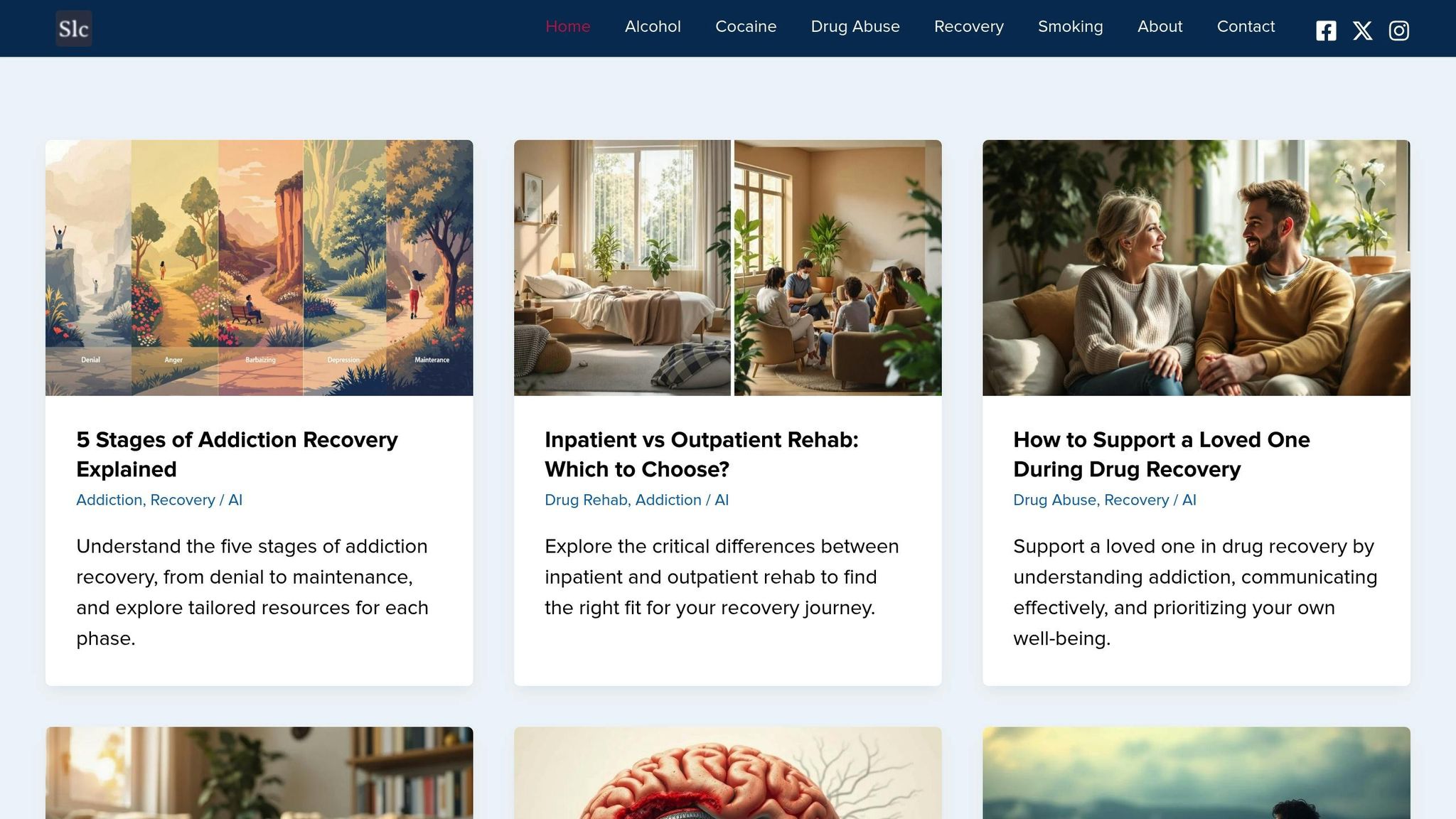Managing triggers is key to staying sober. Triggers – whether emotional, social, or physical – can lead to cravings, but with the right strategies, you can prevent setbacks. Here’s how:
- Identify Triggers: Use journaling, body awareness, and environmental scans to uncover emotional, social, and physical cues that spark cravings.
- Types of Triggers:
- Emotions: Stress, sadness, anxiety, guilt, or loneliness.
- People & Places: Locations or individuals tied to past substance use.
- Body & Mind States: Hunger, fatigue, or chronic pain (HALT: Hungry, Angry, Lonely, Tired).
- Coping Strategies:
- Practice mindfulness to manage cravings.
- Build a support network of trusted friends, family, or sponsors.
- Set boundaries – avoid high-risk environments and remove temptations.
- Use distractions like physical activity, reading, or social connections.
Take Action: Combine personal efforts with professional support like therapy, relapse prevention plans, and peer groups. Managing triggers takes consistent effort, but it’s a vital step toward long-term sobriety.
How Triggers & Cravings Impact Addiction and Sobriety
Main Types of Recovery Triggers
Use your journaling and self-awareness to identify and organize triggers into these categories.
Feelings and Emotions
Triggers tied to emotions are often a major factor in relapse.
Some examples include:
- Stress from work or personal issues
- Emotions like sadness, loneliness, guilt, shame, or anger
- Anxiety or depression
Next, consider how your surroundings and interactions can influence cravings.
People and Places
External triggers can bring back cravings unexpectedly.
These might include:
- Locations associated with past substance use
- Individuals connected to previous habits
- Media that portrays substance use
- Social gatherings involving alcohol or drugs
In addition to emotions and environments, physical and mental states can play a role. Recognizing these can help you build stronger coping mechanisms.
Body and Mind Reactions
The HALT framework – Hungry, Angry, Lonely, Tired – offers a simple way to address common stress-related triggers.
Here’s how you can tackle them:
- Eat balanced meals, practice calming techniques for anger, stay socially connected, and maintain a regular sleep schedule.
Pay attention to other factors like chronic pain, mental health conditions, overconfidence, or romanticizing past substance use.
When working with healthcare professionals, let them know about your recovery journey so they can suggest non-addictive treatment options.
sbb-itb-17645e5
How to Handle Triggers
Once you’ve identified your triggers, here are some practical strategies to help you maintain sobriety.
Using Mindfulness to Manage Cravings
Mindfulness helps you notice cravings without reacting to them. When a trigger appears, acknowledge it by thinking, “This is just a craving.” Then, remind yourself of your sobriety goals and redirect your attention. Practices like meditation or yoga can help you build this skill over time. They also promote a sense of calm, making it easier to handle stress.
Building a Support Network
Surround yourself with people who support your recovery – this could include a mentor, sponsor, or trusted friends and family. When you feel the pull of a craving, reach out to someone in your network. Talking through your feelings can weaken the urge and help you learn healthier ways to cope.
Setting Clear Boundaries
Establishing boundaries is key to avoiding triggers. Here are some steps you can take:
- Remove alcohol, drugs, or any related items from your home.
- Unfollow social media accounts that may tempt you.
- Avoid bars, parties, or other high-risk environments.
If cravings hit, try distracting yourself with activities like these:
- Physical: Go for a walk or clean your space to release tension.
- Mental: Read a book or play a game to shift your focus.
- Social: Call your sponsor, mentor, or a friend for support.
These small actions can make a big difference in staying on track.
Help from Sober Living Centers

Pair your personal recovery efforts with the structured support offered by Sober Living Centers.
Recovery Programs and Services
Addiction counselors work one-on-one to help you understand triggers and create relapse-prevention plans tailored to your needs.
Here are some key programs available:
- Cognitive Behavioral Therapy (CBT): Helps manage impulses and reduce compulsive behaviors.
- Relapse Prevention Planning: Focuses on strategies to handle high-risk situations.
- Family Support: Engages loved ones in the recovery process.
- Outpatient Services: Provides ongoing care for three to six months.
These programs address common triggers – whether emotional, social, or situational – to strengthen your ability to cope.
Support Groups and Community Connections
Our network offers several ways to stay supported:
- Sober Living Homes: Provide structured environments with curfews and peer support to help build stronger coping skills.
- 12-Step Meetings: Encourage regular attendance and connections with sponsors.
- Therapist-Led Groups: Equip participants with tools to manage emotions and compulsions.
- Peer Support Groups: Share experiences with others to foster resilience and mutual understanding.
These resources are designed to help you stay on track and feel supported throughout your recovery journey.
Conclusion: Taking Control & Moving Forward
Managing triggers is an essential part of staying sober for the long haul. By combining self-awareness with practical coping strategies, you can build the strength to handle challenges. While triggers may always be a part of life, how you respond is entirely up to you.
Now that you’ve identified your triggers and learned coping techniques, make them part of your daily routine. Incorporate practices like mindfulness, regular physical activity, journaling about triggers, and seeking professional counseling to strengthen your emotional well-being.
This process takes consistent effort. Take advantage of the resources and connections available through Sober Living Centers. From educational tools to program referrals and support groups, there’s a network ready to help you stay on track. Balancing your personal efforts with professional support and peer encouragement is key to maintaining sobriety.


